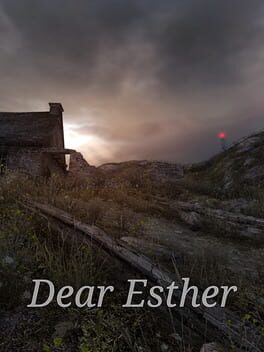

Dear Esther is a ghost story, told using first-person gaming technologies. Rather than traditional game-play the focus here is on exploration, uncovering the mystery of the island, of who you are and why you are here. Fragments of story are randomly uncovered when exploring the various locations of the island, making every each journey a unique experience.
Released on
Genres
Reviews View More
Tras la tormenta producida por este juego en 2012, y las discusiones inútiles fomentadas por Youtubers sin sentido del gusto, Dear Esther se ha quedado como un vago recuerdo de una época en la que parecía que cada semana aparecía un nuevo juego que rompía la barrera del "arte" y se ganaba el respeto del público general. Pero si vuelves a jugarlo hoy, sin la morralla que lo rodeó, verás un proyecto visual y auditivo muy logrado que aspira a ser una novela inglesa modernista, pero que por desgracia no termina de aterrizar.
Es una desgracia, pero tenemos que tener en cuenta que Dear Esther compite con gigantes como Proteus por el tipo de inmersión que sólo un puñado de obras han logrado. Y a decir verdad, la manera en que este juego consigue sumergirte en un páramo fantasmagórico de sonidos, tanto reales como imaginados, es comparable a apenas un puñado de obras incluso hoy.
Por otra parte, el emplazamiento de objetos e ítems es exquisito, y contribuye más que la narración, la actuación o incluso la luz a sentir que lo que estás jugando no es un lugar real, sino uno metafórico, situado entre la Historia y el Yo.
-----------------------
After the storm produced by this game in 2012, and the pointless discussions pushed by Youtubers with no sense of taste, Dear Esther has become a vague memory of a time when it seemed that every week a new game was attempting to break the “art” barrier and earn the respect of the general public. But if you play it today and without the its context, you'll see a pretty accomplishing visual and aural project that aspires to be a modernist novel, but doesn't quite stick the landing for me.
It's unfortunate, but we have to keep in mind that Dear Esther competes with giants like Proteus for the kind of immersion it's promoting. And truth be told, the way this game manages to insert you into a ghostly wasteland of real and ethereal sounds is comparable only to a handful of works today.
On the other hand, the placement of objects and items is exquisite, and contributes more than the narration, the acting or even the lighting to the feeling that what you are playing is not a real place, but a metaphorical one, situated between History and Self.
Es una desgracia, pero tenemos que tener en cuenta que Dear Esther compite con gigantes como Proteus por el tipo de inmersión que sólo un puñado de obras han logrado. Y a decir verdad, la manera en que este juego consigue sumergirte en un páramo fantasmagórico de sonidos, tanto reales como imaginados, es comparable a apenas un puñado de obras incluso hoy.
Por otra parte, el emplazamiento de objetos e ítems es exquisito, y contribuye más que la narración, la actuación o incluso la luz a sentir que lo que estás jugando no es un lugar real, sino uno metafórico, situado entre la Historia y el Yo.
-----------------------
After the storm produced by this game in 2012, and the pointless discussions pushed by Youtubers with no sense of taste, Dear Esther has become a vague memory of a time when it seemed that every week a new game was attempting to break the “art” barrier and earn the respect of the general public. But if you play it today and without the its context, you'll see a pretty accomplishing visual and aural project that aspires to be a modernist novel, but doesn't quite stick the landing for me.
It's unfortunate, but we have to keep in mind that Dear Esther competes with giants like Proteus for the kind of immersion it's promoting. And truth be told, the way this game manages to insert you into a ghostly wasteland of real and ethereal sounds is comparable only to a handful of works today.
On the other hand, the placement of objects and items is exquisite, and contributes more than the narration, the acting or even the lighting to the feeling that what you are playing is not a real place, but a metaphorical one, situated between History and Self.
Played this game some years ago and I can't remember much of the plot now. I gave it two stars on my other website so it probably means that the story wasn't that good to begin with. I think this is an indie game made to captivate people's attention on its visuals but not that type of game that will make you love it for its story.
Para ser uno de los padres de los Walking simulators me sorprendió bastante y para bien. Si bien la historia se cuenta un poco confusa (es parte de la gracia) se termina de entender mas o menos que sucedió, pero se cuenta todo de una forma muy poética y con metáforas, la verdad que me encantó es cortito y al pie
